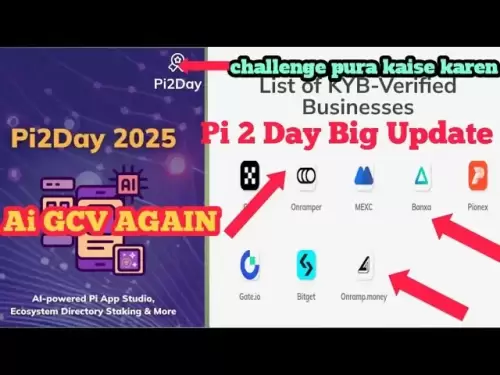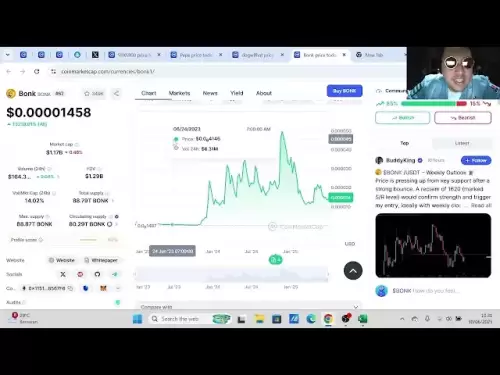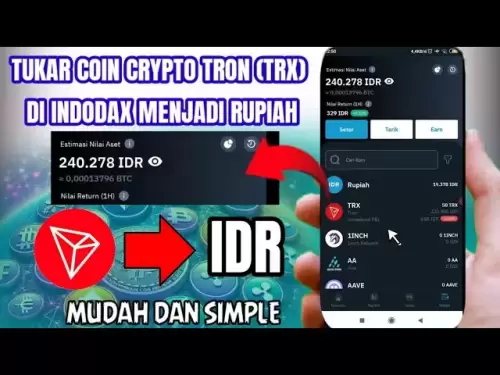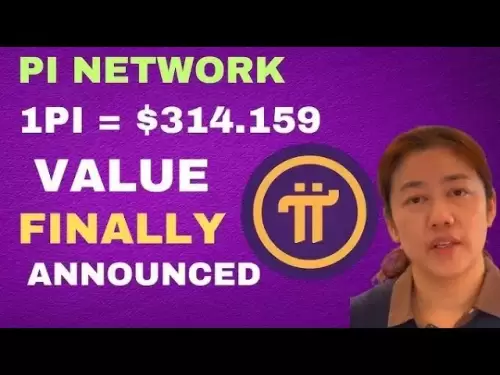-
 Bitcoin
Bitcoin $108,489.6704
1.13% -
 Ethereum
Ethereum $2,502.0528
2.92% -
 Tether USDt
Tether USDt $1.0002
0.00% -
 XRP
XRP $2.1941
0.51% -
 BNB
BNB $655.3375
1.00% -
 Solana
Solana $151.5977
1.27% -
 USDC
USDC $0.9999
0.00% -
 TRON
TRON $0.2768
0.32% -
 Dogecoin
Dogecoin $0.1676
2.86% -
 Cardano
Cardano $0.5675
0.98% -
 Hyperliquid
Hyperliquid $40.6109
7.48% -
 Bitcoin Cash
Bitcoin Cash $500.7746
2.09% -
 Sui
Sui $2.8328
2.03% -
 Chainlink
Chainlink $13.4452
1.26% -
 UNUS SED LEO
UNUS SED LEO $9.1623
0.39% -
 Avalanche
Avalanche $18.2267
2.24% -
 Stellar
Stellar $0.2382
0.00% -
 Toncoin
Toncoin $2.8885
1.68% -
 Shiba Inu
Shiba Inu $0.0...01159
0.91% -
 Litecoin
Litecoin $87.1827
0.88% -
 Hedera
Hedera $0.1511
2.90% -
 Monero
Monero $315.4992
-0.59% -
 Polkadot
Polkadot $3.4663
2.34% -
 Bitget Token
Bitget Token $4.6118
-0.65% -
 Dai
Dai $1.0000
-0.01% -
 Ethena USDe
Ethena USDe $1.0003
0.02% -
 Uniswap
Uniswap $7.2989
4.69% -
 Pepe
Pepe $0.0...01003
5.73% -
 Aave
Aave $275.5616
7.15% -
 Pi
Pi $0.5181
-2.49%
What are the advantages of SOL compared to other cryptocurrencies?
Solana (SOL) offers faster transaction speeds and lower fees than Bitcoin or Ethereum, enabling scalable smart contract functionality and attracting a strong developer community, despite ongoing decentralization improvements.
Mar 13, 2025 at 02:50 pm
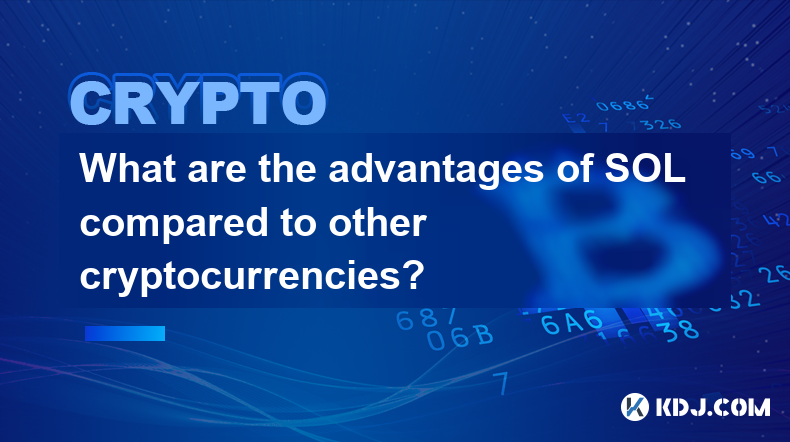
Key Points:
- High Transaction Speed and Low Fees: Solana's innovative consensus mechanism allows for significantly faster transaction processing and lower fees than many other blockchains.
- Scalability: Solana's architecture is designed for scalability, aiming to handle a large number of transactions per second, unlike some cryptocurrencies that suffer from congestion.
- Smart Contract Functionality: Solana supports smart contracts, enabling the development of decentralized applications (dApps) and DeFi protocols.
- Strong Developer Community: A vibrant and growing developer community actively contributes to Solana's ecosystem, fostering innovation and growth.
- Focus on Decentralization: While facing criticisms, Solana actively works towards improving its decentralization aspects.
What are the advantages of SOL compared to other cryptocurrencies? Solana (SOL) distinguishes itself in the crowded cryptocurrency market through several key advantages. Unlike many other blockchains that struggle with scalability and high transaction fees, Solana offers a compelling alternative. Its innovative architecture and consensus mechanism allow for significantly faster transaction processing and lower costs, making it attractive for both developers and users.
One of the most significant advantages of SOL is its impressive transaction speed. Solana boasts the ability to process thousands of transactions per second (TPS), far exceeding the capabilities of many established cryptocurrencies like Bitcoin or Ethereum. This high TPS is crucial for handling the demands of decentralized applications (dApps) and DeFi platforms that require fast and efficient transaction processing. This speed contributes directly to a smoother user experience.
Furthermore, Solana's low transaction fees are a significant advantage. The cost of sending or receiving SOL, or interacting with dApps on the Solana network, is generally much lower than on competing platforms like Ethereum. This affordability opens up opportunities for a wider range of users and applications, fostering greater adoption and accessibility.
Beyond speed and cost, Solana's smart contract functionality is a key differentiator. Smart contracts are self-executing contracts with the terms of the agreement between buyer and seller being directly written into lines of code. This allows developers to build decentralized applications (dApps) and DeFi protocols on the Solana blockchain, mirroring Ethereum's capabilities but with potentially superior performance. This opens the door to a diverse range of applications within the Solana ecosystem.
The strength of Solana's developer community is another significant factor contributing to its success. A large and active developer community is crucial for the long-term health and growth of any blockchain platform. This community continuously develops new tools, libraries, and applications, enriching the Solana ecosystem and driving innovation. The community's contributions are vital to the platform's ongoing development and improvement.
While often touted for its speed and scalability, Solana has also faced criticisms regarding its decentralization. Concerns have been raised about the network's concentration of validator nodes and the potential for centralization. However, Solana's developers are actively working to address these concerns through various initiatives aimed at improving the network's decentralization and robustness. Ongoing efforts focus on expanding the validator network and enhancing the security of the consensus mechanism.
Compared to Bitcoin, Solana offers significantly faster transaction speeds and lower fees. Bitcoin's primary focus is on its role as a store of value, and its transaction throughput is comparatively much lower. This makes Solana more suitable for applications requiring high throughput and quick transaction finality.
In comparison to Ethereum, while both support smart contracts, Solana boasts a considerable advantage in terms of transaction speed and cost. Ethereum's transaction fees (gas fees) have historically been high, making it expensive to use for many applications. Solana's superior scalability and lower fees present a compelling alternative.
Solana's approach to consensus differs from Proof-of-Work (PoW) used by Bitcoin and Proof-of-Stake (PoS) used by Ethereum. It utilizes a unique hybrid consensus mechanism called Proof-of-History (PoH) in conjunction with Proof-of-Stake (PoS). PoH provides a verifiable history of transactions, improving efficiency and scalability, while PoS secures the network through stake-weighted voting.
Developing on Solana involves using various tools and resources.
- Rust Programming Language: Rust is the primary language for developing Solana programs.
- Solana CLI: The command-line interface provides tools for interacting with the Solana network.
- Anchor Framework: A popular framework simplifies smart contract development on Solana.
- Serum DEX: A decentralized exchange built on Solana offers tools and resources for DeFi development.
The potential risks associated with investing in Solana include:
- Network Volatility: The cryptocurrency market is inherently volatile, and the price of SOL can fluctuate significantly.
- Technological Risks: As a relatively new blockchain, Solana may encounter unforeseen technical challenges.
- Regulatory Uncertainty: The regulatory landscape for cryptocurrencies is constantly evolving, and changes could impact Solana's future.
Frequently Asked Questions:
Q: Is Solana decentralized?
A: Solana aims for decentralization but has faced criticism regarding the concentration of validators. Ongoing efforts focus on improving decentralization.
Q: How does Solana's transaction speed compare to Ethereum?
A: Solana significantly outperforms Ethereum in terms of transaction speed, processing thousands of transactions per second compared to Ethereum's hundreds.
Q: What are the fees like on Solana?
A: Solana's transaction fees are generally much lower than Ethereum's, making it a more cost-effective option for many applications.
Q: What programming language is used for Solana development?
A: Rust is the primary programming language for developing on the Solana blockchain.
Q: What are the risks of investing in SOL?
A: Risks include market volatility, technological challenges, and regulatory uncertainty.
Disclaimer:info@kdj.com
The information provided is not trading advice. kdj.com does not assume any responsibility for any investments made based on the information provided in this article. Cryptocurrencies are highly volatile and it is highly recommended that you invest with caution after thorough research!
If you believe that the content used on this website infringes your copyright, please contact us immediately (info@kdj.com) and we will delete it promptly.
- Ripple XRP, Bitcoin, and Solaris Presale: What's the Buzz?
- 2025-06-30 18:50:11
- SpaceX, Mirror Tokens, and Investors: A Wild Ride to the Future?
- 2025-06-30 19:10:22
- Arbitrum (ARB) and Robinhood: Partnership Rumors Fuel Price Surge to $0.4289?
- 2025-06-30 19:10:22
- Jasmy Coin, Bitcoin, and the Rise of Solaris Presale: What's the Buzz?
- 2025-06-30 18:30:12
- XRP, SEC, and Ripple: A New Chapter?
- 2025-06-30 19:15:13
- Arbitrum's ARB Price Surges Amid Robinhood Partnership Buzz: A New York Minute on Crypto
- 2025-06-30 19:30:12
Related knowledge

How to customize USDT TRC20 mining fees? Flexible adjustment tutorial
Jun 13,2025 at 01:42am
Understanding USDT TRC20 Mining FeesMining fees on the TRON (TRC20) network are essential for processing transactions. Unlike Bitcoin or Ethereum, where miners directly validate transactions, TRON uses a delegated proof-of-stake (DPoS) mechanism. However, users still need to pay bandwidth and energy fees, which are collectively referred to as 'mining fe...

USDT TRC20 transaction is stuck? Solution summary
Jun 14,2025 at 11:15pm
Understanding USDT TRC20 TransactionsWhen users mention that a USDT TRC20 transaction is stuck, they typically refer to a situation where the transfer of Tether (USDT) on the TRON blockchain has not been confirmed for an extended period. This issue may arise due to various reasons such as network congestion, insufficient transaction fees, or wallet-rela...

How to cancel USDT TRC20 unconfirmed transactions? Operation guide
Jun 13,2025 at 11:01pm
Understanding USDT TRC20 Unconfirmed TransactionsWhen dealing with USDT TRC20 transactions, it’s crucial to understand what an unconfirmed transaction means. An unconfirmed transaction is one that has been broadcasted to the blockchain network but hasn’t yet been included in a block. This typically occurs due to low transaction fees or network congestio...

How to check USDT TRC20 balance? Introduction to multiple query methods
Jun 21,2025 at 02:42am
Understanding USDT TRC20 and Its ImportanceUSDT (Tether) is one of the most widely used stablecoins in the cryptocurrency market. It exists on multiple blockchain networks, including TRC20, which operates on the Tron (TRX) network. Checking your USDT TRC20 balance accurately is crucial for users who hold or transact with this asset. Whether you're sendi...

What to do if USDT TRC20 transfers are congested? Speed up trading skills
Jun 13,2025 at 09:56am
Understanding USDT TRC20 Transfer CongestionWhen transferring USDT TRC20, users may occasionally experience delays or congestion. This typically occurs due to network overload on the TRON blockchain, which hosts the TRC20 version of Tether. Unlike the ERC20 variant (which runs on Ethereum), TRC20 transactions are generally faster and cheaper, but during...

The relationship between USDT TRC20 and TRON chain: technical background analysis
Jun 12,2025 at 01:28pm
What is USDT TRC20?USDT TRC20 refers to the Tether (USDT) token issued on the TRON blockchain using the TRC-20 standard. Unlike the more commonly known ERC-20 version of USDT (which runs on Ethereum), the TRC-20 variant leverages the TRON network's infrastructure for faster and cheaper transactions. The emergence of this version came as part of Tether’s...

How to customize USDT TRC20 mining fees? Flexible adjustment tutorial
Jun 13,2025 at 01:42am
Understanding USDT TRC20 Mining FeesMining fees on the TRON (TRC20) network are essential for processing transactions. Unlike Bitcoin or Ethereum, where miners directly validate transactions, TRON uses a delegated proof-of-stake (DPoS) mechanism. However, users still need to pay bandwidth and energy fees, which are collectively referred to as 'mining fe...

USDT TRC20 transaction is stuck? Solution summary
Jun 14,2025 at 11:15pm
Understanding USDT TRC20 TransactionsWhen users mention that a USDT TRC20 transaction is stuck, they typically refer to a situation where the transfer of Tether (USDT) on the TRON blockchain has not been confirmed for an extended period. This issue may arise due to various reasons such as network congestion, insufficient transaction fees, or wallet-rela...

How to cancel USDT TRC20 unconfirmed transactions? Operation guide
Jun 13,2025 at 11:01pm
Understanding USDT TRC20 Unconfirmed TransactionsWhen dealing with USDT TRC20 transactions, it’s crucial to understand what an unconfirmed transaction means. An unconfirmed transaction is one that has been broadcasted to the blockchain network but hasn’t yet been included in a block. This typically occurs due to low transaction fees or network congestio...

How to check USDT TRC20 balance? Introduction to multiple query methods
Jun 21,2025 at 02:42am
Understanding USDT TRC20 and Its ImportanceUSDT (Tether) is one of the most widely used stablecoins in the cryptocurrency market. It exists on multiple blockchain networks, including TRC20, which operates on the Tron (TRX) network. Checking your USDT TRC20 balance accurately is crucial for users who hold or transact with this asset. Whether you're sendi...

What to do if USDT TRC20 transfers are congested? Speed up trading skills
Jun 13,2025 at 09:56am
Understanding USDT TRC20 Transfer CongestionWhen transferring USDT TRC20, users may occasionally experience delays or congestion. This typically occurs due to network overload on the TRON blockchain, which hosts the TRC20 version of Tether. Unlike the ERC20 variant (which runs on Ethereum), TRC20 transactions are generally faster and cheaper, but during...

The relationship between USDT TRC20 and TRON chain: technical background analysis
Jun 12,2025 at 01:28pm
What is USDT TRC20?USDT TRC20 refers to the Tether (USDT) token issued on the TRON blockchain using the TRC-20 standard. Unlike the more commonly known ERC-20 version of USDT (which runs on Ethereum), the TRC-20 variant leverages the TRON network's infrastructure for faster and cheaper transactions. The emergence of this version came as part of Tether’s...
See all articles





















